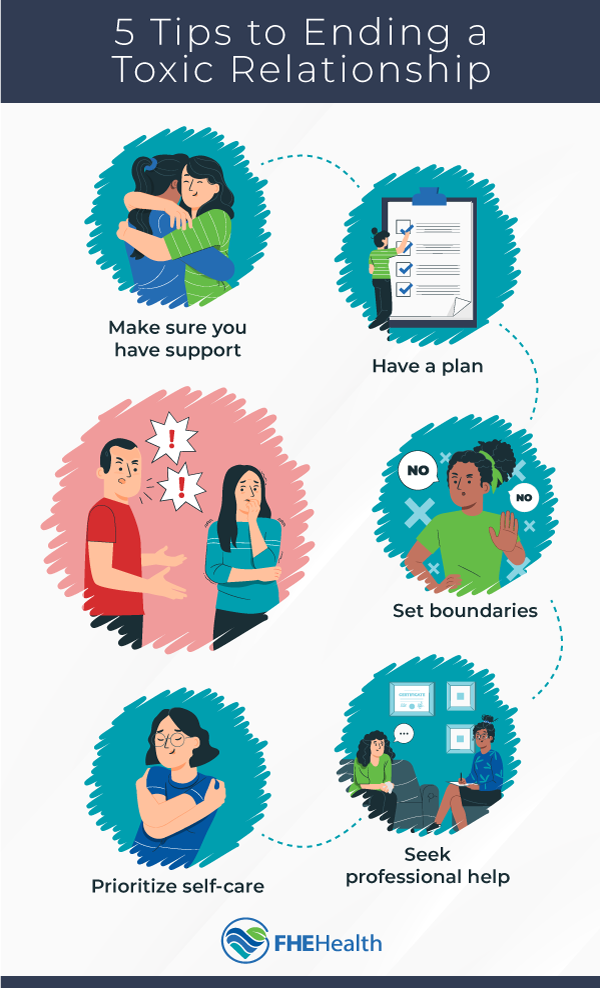
Your relationship should bring you joy, comfort and feelings of safety. The right partner will uplift you and challenge you to be a better version of yourself. But the wrong partner will do the opposite. An unhealthy relationship can pull you down, make you miserable and even trigger mental health problems. That’s why ending toxic relationships is an important skill everyone should have.
Recognizing Signs of Unhealthy Relationships
Often, you don’t realize you’re in an unhealthy relationship until it’s gone too far and something drastic has happened. Recognizing the signs earlier can let you move on more quickly. Here are some warning signs that your relationship is unhealthy.
1. Your Loved Ones Hate Your Partner
Your friends and family only want what’s best for you. So, if they see you unhappy or being treated poorly, they’ll resent your partner. And you’ll probably pick up on this resentment.
If your loved ones don’t like your partner, have an open conversation with them and ask why. They see things from a different viewpoint than you and might be able to point out some things you haven’t noticed.
2. Your Mental Health Is Deteriorating
Have you noticed that since being with your partner, your mental health has worsened? Maybe you’ve developed depression, anxiety or insomnia. The bottom line is that your relationship is unhealthy if it’s taking a toll on your mental health.
3. You’re Being Abused
According to the CDC, approximately 25% of women will experience physical abuse from their intimate partner at some point in their lifetime. This is a sad, shocking statistic, but it shows how this situation can happen to anyone.
Any form of abuse in a relationship is unacceptable. If you’re being physically, verbally, emotionally, sexually or financially abused, your relationship is harming you. Confide in friends and family and find a way to get out immediately.
4. You Don’t Trust Them
A healthy relationship is built on trust. If you can’t trust your partner or they don’t trust you, you need to address this problem or choose to move on from each other.
And if you don’t trust your partner because they’re frequently dishonest, don’t let them gaslight you into believing you’re the problem.
5. They’re Controlling
Your partner should never control you. This includes controlling your finances, who you see, how you dress and where you go. If you notice this is happening, it’s time to leave.
6. They’re Disrespectful Toward You
A partner should be like a pedestal, always lifting you up, not kicking you down. One who’s disrespectful, in public or private, doesn’t value and appreciate you.
Ending Toxic Relationships: 5 Tips to Help You Cut the Cord
Ending toxic relationships can be challenging, especially if you still love the person. But the longer you stay, the more risks there are that the relationship will harm your mental health. Moving on from toxic people is an integral part of caring for yourself. As Taylor Swift so eloquently said in an interview, “The trash takes itself out.”
Here are five steps to take when letting go of unhealthy connections.
1. Make Sure You Have Support
When you leave a partner, having friends and family to lean on can be helpful. You’ll need someone to talk to, spend time with and vent to. Ensure you have a support circle, and let them know about your plans to leave.
2. Have a Plan
Consider the logistics of breaking up with your partner and what that means. If you live together, do you know who’ll move out? If you share a pet, will you or your partner be the primary caregiver moving forward? You need to outline these details so you can make what you want clear to your ex.
3. Set Boundaries
We won’t sugarcoat this — if you’re leaving a toxic relationship, you should go no contact. An unhealthy relationship doesn’t add value to your life, and keeping in touch with this person will only cause you both to slip back into bad habits.
Make it known that you don’t want future contact, and promise yourself you won’t break on this. Consider blocking their number and social media accounts so you can’t contact them.
4. Seek Professional Help
An unhealthy relationship probably took a toll on your mental health. Even if you feel you’ve left “unscathed,” you could likely benefit from speaking to a mental health professional. Working with a therapist will allow you to unpack any trauma you’ve been through, work through unresolved feelings and identify what led you to be with a toxic partner.
Most importantly, you’ll probably need help to relearn how to love yourself. A toxic partner can diminish a person’s self-worth, especially if you’ve been with them for an extended period. A therapist can help you improve your internal dialogue to relearn how to be kind to yourself.
5. Prioritize Self-Care
Self-care after a breakup is always essential. You want to take this time to reflect on what you’ve been through and get in touch with yourself again. Some self-care tips for the post-breakup time include:
- Taking up a new hobby
- Getting a makeover
- Booking a solo trip or a trip with friends
- Embracing a healthy routine around eating, exercising and sleeping
- Mediating, journaling or practicing yoga
- Prioritizing your needs and wants
Embracing Positive Growth and Moving Forward
As you look to the future, having a positive mindset is essential. Your relationship may have been unhealthy, but you don’t have to regret it. Instead, see it as a learning opportunity. Now that you’re out of the relationship, you know what you don’t want in a partner. And you can focus on reprioritizing yourself.
Don’t rush into dating again. Instead, take some time to get to know you again. Remember, you’re whole without a significant other. And a better partner will come soon enough.
Therapy at FHE Health
If you’re ready to take care of your mental health, FHE Health can help. Our professional therapists can help you recover from your unhealthy relationship so you can be your old, happy self. Contact us today to set up an appointment or find out more.







